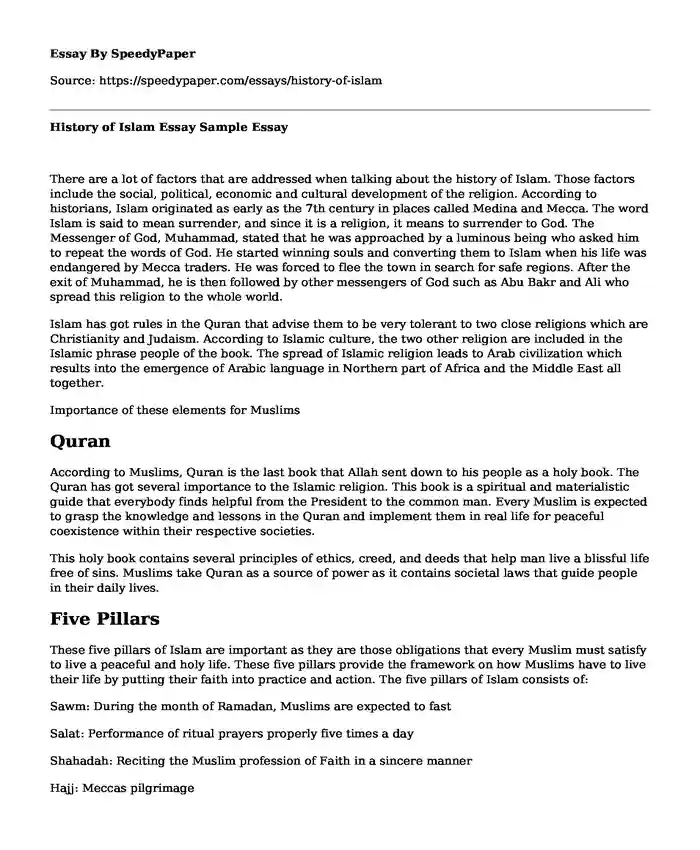There are a lot of factors that are addressed when talking about the history of Islam. Those factors include the social, political, economic and cultural development of the religion. According to historians, Islam originated as early as the 7th century in places called Medina and Mecca. The word Islam is said to mean surrender, and since it is a religion, it means to surrender to God. The Messenger of God, Muhammad, stated that he was approached by a luminous being who asked him to repeat the words of God. He started winning souls and converting them to Islam when his life was endangered by Mecca traders. He was forced to flee the town in search for safe regions. After the exit of Muhammad, he is then followed by other messengers of God such as Abu Bakr and Ali who spread this religion to the whole world.
Islam has got rules in the Quran that advise them to be very tolerant to two close religions which are Christianity and Judaism. According to Islamic culture, the two other religion are included in the Islamic phrase people of the book. The spread of Islamic religion leads to Arab civilization which results into the emergence of Arabic language in Northern part of Africa and the Middle East all together.
Importance of these elements for Muslims
Quran
According to Muslims, Quran is the last book that Allah sent down to his people as a holy book. The Quran has got several importance to the Islamic religion. This book is a spiritual and materialistic guide that everybody finds helpful from the President to the common man. Every Muslim is expected to grasp the knowledge and lessons in the Quran and implement them in real life for peaceful coexistence within their respective societies.
This holy book contains several principles of ethics, creed, and deeds that help man live a blissful life free of sins. Muslims take Quran as a source of power as it contains societal laws that guide people in their daily lives.
Five Pillars
These five pillars of Islam are important as they are those obligations that every Muslim must satisfy to live a peaceful and holy life. These five pillars provide the framework on how Muslims have to live their life by putting their faith into practice and action. The five pillars of Islam consists of:
Sawm: During the month of Ramadan, Muslims are expected to fast
Salat: Performance of ritual prayers properly five times a day
Shahadah: Reciting the Muslim profession of Faith in a sincere manner
Hajj: Meccas pilgrimage
Zakat: Paying tax based on charity to help the needy and the poor
Ramadan
Ramadan is the nine month according to the Islamic calendar where Muslims are expected to fast during the day. This month is important as it is the month Allah revealed the Holy book Quran. According to Muslims, Allah made this month the fourth pillar. It is the month Allah made Laylat al-Qadr. The fasting that happens during this month is important as in turn Allah forgives Islamic followers their sins. Ramadan is symbolic as this is the month Allah chains evil and closes the doors to hell thus opening the gates to Paradise. It is during this month that Allah redeems people from fire every night.
Describe the significance differences and similarities in how the branches of Islam (Sunni, Shiite, and Sufi) practice their tradition
The Sunni and Shiite started their differences during the period of succession of Muhammad. The Sunnis all a long believed that Muhammad didnt choose a successor while the Shiite insist that the selected his brother in law and cousin, Ali.
All the branches of Islam share Quran but with different Hadith collection. As the Sunni believe the Hadith always come from the companions of the Prophet, the Shiite believe that the source of Hadith is the imams. In case there is a matter to be settled, the Sunnis rely on the consensus of the community while Shiites depend on the Imams infallibility. On the other hand, Sufi is a school of law that is contemplative and aims at developing ones consciousness of God through music, recitation of litanies, physical movement, and chanting. Another amazing issue is the fact that Sufi avoids politics as they view it as a compromising factor in worshiping God.
Cite this page
History of Islam Essay Sample. (2019, Nov 11). Retrieved from https://speedypaper.net/essays/history-of-islam
Request Removal
If you are the original author of this essay and no longer wish to have it published on the SpeedyPaper website, please click below to request its removal:
- Essay Sample on How Hyper Parenting Impacts a Child's Development
- Free Essay Example: Local Knowledge Methodology vs Scientific Knowledge
- Essay Sample: Brief Explanation of the Chosen Party and Candidature
- Essay Sample: United States Health Care vs. the German Health Care
- Essay Sample on the Article Reviewed
- Paper Example. Brick and Mortar Outlets
- ILAC Hypotheticals Brad, Elena, and Jack. Free Essay
Popular categories





